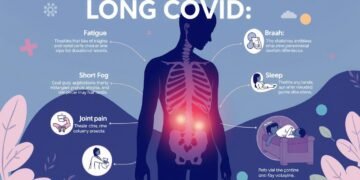Maintaining a healthy body is crucial for overall well-being, and one essential nutrient plays a significant role in achieving this: vitamin D. This vital component is key to supporting bone health, immune function, and even mental well-being.
Despite its importance, many individuals are unaware that they might be suffering from a lack of this crucial vitamin. Recognizing the signs of deficiency is the first step towards rectifying the issue and restoring optimal health.
A vitamin D deficiency can manifest in various ways, often subtle at first, making it essential to be aware of the indicators. Understanding the benefits of vitamin D and being mindful of its levels can significantly impact one’s quality of life.
Key Takeaways
- Vitamin D is crucial for bone health and immune function.
- A deficiency can lead to various health issues.
- Recognizing the signs is key to addressing the problem.
- Maintaining optimal vitamin D levels is vital for overall health.
- A healthy lifestyle can help prevent deficiency.
What is Vitamin D and Why is it Important?
Vitamin D is a vital component of a healthy lifestyle, influencing bone density, immune response, and even mental well-being. It is a fat-soluble vitamin that plays a critical role in maintaining strong bones, immune function, and overall health.
Role of Vitamin D in Bone Health
Vitamin D is essential for calcium absorption and bone mineralization. Without sufficient vitamin D, bones can become thin, brittle, or misshapen. Vitamin D helps maintain serum calcium and phosphate levels, ensuring that bones remain healthy.
| Benefit | Description |
|---|---|
| Calcium Absorption | Vitamin D aids in the absorption of calcium, crucial for bone health. |
| Bone Mineralization | Vitamin D is necessary for the proper mineralization of bones. |
| Reduced Fracture Risk | Adequate vitamin D levels can reduce the risk of fractures. |
Impact on Immune Function
Vitamin D has a significant impact on immune health, helping to regulate the immune system’s response to pathogens. It has been shown to influence the expression of genes involved in immune response, enhancing the pathogen-fighting ability of various immune cells.
- Regulation of immune cell function
- Modulation of inflammatory responses
- Enhancement of pathogen-fighting capabilities
Connection to Mood and Mental Health
Emerging evidence suggests that vitamin D may also play a role in mood regulation and mental health. Vitamin D receptors are present in areas of the brain involved in mood regulation, and studies have found correlations between vitamin D deficiency and depression.
Maintaining adequate vitamin D levels is crucial for overall health, including bone health, immune function, and potentially mood and mental well-being. Ensuring sufficient vitamin D through a combination of sun exposure, diet, and supplements can help mitigate the risks associated with deficiency.
Common Causes of Vitamin D Deficiency
Understanding the causes of vitamin D deficiency is crucial for maintaining a healthy body. Vitamin D plays a significant role in bone health, immune function, and mental well-being. Despite its importance, many individuals suffer from a deficiency due to various factors.
Insufficient Sun Exposure
One of the primary causes of vitamin D deficiency is insufficient sun exposure. Vitamin D is unique because it can be synthesized in the skin upon exposure to sunlight. However, factors such as living in regions with limited sunlight, having a lifestyle that keeps you indoors, or using sunscreen regularly can significantly reduce vitamin D production.
People who live in northern latitudes or during the winter months when the sun is lower in the sky are at a higher risk. Additionally, individuals who work indoors or have limited outdoor activities are also more likely to be deficient.
Dietary Limitations
Dietary limitations are another significant factor contributing to vitamin D deficiency. Vitamin D is found in limited food sources, primarily in fatty fish, fortified dairy products, and some mushrooms. Individuals who follow a strict vegan diet or have limited intake of these foods are at risk.
Furthermore, even among those who consume vitamin D-rich foods, the amount might not be sufficient to meet daily needs, especially if the diet is not well-balanced. Nutrition facts indicate that most people do not get enough vitamin D from their diet alone.
Medical Conditions Affecting Absorption
Certain medical conditions can affect the body’s ability to absorb vitamin D. Conditions such as celiac disease, Crohn’s disease, and kidney or liver diseases can impair vitamin D absorption.
Additionally, obesity can also affect vitamin D levels, as vitamin D is a fat-soluble vitamin, and its absorption can be affected by body fat. Understanding these factors is crucial for identifying individuals at risk and taking appropriate measures to mitigate deficiency.
Sign
If you’re constantly feeling drained, it might be a sign that your Vitamin D levels are lower than they should be. Fatigue is one of the most common complaints among individuals with Vitamin D deficiency. It’s not just about feeling tired after a long day or a strenuous workout; it’s a persistent lack of energy that doesn’t seem to improve with rest.
This kind of fatigue can be debilitating, affecting not just your productivity but also your overall quality of life. Simple tasks can become daunting challenges, and even getting out of bed can feel like a monumental task. If you’re experiencing this level of exhaustion, it’s essential to consider whether your Vitamin D levels might be a contributing factor.
Boosting your energy levels might be as simple as addressing a Vitamin D deficiency. This can involve a combination of sun exposure, dietary adjustments, and potentially supplements. Understanding the link between Vitamin D and energy is crucial for finding effective fatigue solutions.
- Assess your current Vitamin D levels through a blood test.
- Increase your sun exposure, especially during peak hours.
- Adjust your diet to include more Vitamin D-rich foods.
- Consider Vitamin D supplements after consulting with a healthcare professional.
By taking these steps, you can begin to address the root cause of your fatigue and work towards regaining your energy levels. It’s about making informed decisions to improve your health and well-being.
1: Fatigue and Tiredness
Feeling tired and sluggish can significantly impact daily life. Fatigue is a common complaint that can stem from various factors, including nutritional deficiencies. When the body lacks essential nutrients, it can lead to a noticeable decrease in energy levels.
One often overlooked factor contributing to fatigue is a specific condition that affects millions worldwide. Addressing this issue can be crucial in finding effective fatigue solutions. By understanding the underlying causes, individuals can take the first step towards regaining their vitality and improving overall well-being.
Key Takeaways
- Fatigue can be a sign of an underlying nutritional issue.
- Energy levels can be impacted by various factors, including diet.
- Identifying the root cause is crucial for effective fatigue solutions.
- Simple changes can significantly improve overall energy.
- Understanding the link between nutrition and fatigue is key to addressing it.
Sign
The connection between Vitamin D and mental health is profound, with deficiencies often manifesting as mood disorders.
Research has shown that Vitamin D receptors are present in areas of the brain involved in regulating mood, suggesting a direct link between Vitamin D levels and mental health outcomes.
Individuals with Vitamin D deficiency are more likely to experience symptoms of depression and seasonal affective disorder, particularly during periods of low sunlight exposure.
Addressing Vitamin D deficiency can be a crucial step in managing mood changes and supporting overall mental health.
2: Mood Changes and Depression
Mood changes and depression are significant concerns that affect millions of people worldwide. Research has shown a compelling link between mental health and the levels of a crucial nutrient in our bodies.
The connection between this nutrient and mood regulation is complex, involving various biological processes. Studies have indicated that individuals with lower levels of this nutrient are more likely to experience symptoms of depression and other mood disorders.
Understanding the impact of this nutrient on mental well-being can provide valuable insights into potential preventive measures and treatments. The benefits of maintaining adequate levels of this nutrient are multifaceted, contributing to overall health and potentially mitigating the risk of mood-related disorders.
Key Takeaways
- The relationship between a specific nutrient and mood changes is supported by scientific evidence.
- Low levels of this nutrient have been linked to an increased risk of depression.
- Maintaining adequate levels of this nutrient is crucial for mental health.
- The benefits of this nutrient extend beyond mood regulation to overall well-being.
- Further understanding of this nutrient’s role could lead to new approaches in managing mood disorders.
Sign
Another key indicator that you might be low on Vitamin D is experiencing persistent muscle and joint pain. This type of pain can manifest in various ways, from a dull ache to sharp, stabbing sensations, and can significantly impact your quality of life.
Research has shown that Vitamin D plays a crucial role in maintaining muscle strength and function. A deficiency can lead to muscle weakness, making everyday activities more challenging. Moreover, joint pain associated with Vitamin D deficiency can be mistaken for conditions like arthritis, making diagnosis tricky without proper testing.
It’s essential to recognize that muscle and joint pain can stem from multiple causes. However, if you’re experiencing persistent or recurring pain without an apparent reason, it’s worth considering the possibility of a Vitamin D deficiency. Consulting with a healthcare professional can provide clarity and guide appropriate treatment.
Addressing Vitamin D deficiency can help alleviate muscle and joint pain, among other symptoms. This can involve a combination of dietary changes, supplements, and increased sun exposure, tailored to individual needs.
3: Muscle and Joint Pain
Experiencing persistent muscle and joint pain can be debilitating, affecting daily activities and overall quality of life. This discomfort is often associated with a range of factors, including a specific health condition that impacts a significant portion of the population.
Maintaining a healthy body is crucial, and understanding the link between muscle and joint pain and its underlying causes is the first step towards relief. One such cause is related to the benefits and deficiencies of a crucial nutrient that plays a significant role in bone health and immune function.
When this nutrient is lacking, it can lead to various symptoms, including muscle and joint pain. Fortunately, understanding the physiological reasons behind this symptom can help in identifying potential remedies, ranging from dietary adjustments to supplements that support overall well-being and vitamin D benefits.
Key Takeaways
- Muscle and joint pain can be a symptom of an underlying health condition.
- A specific nutrient plays a crucial role in bone health and immune function.
- Deficiencies in this nutrient can lead to various symptoms, including muscle and joint pain.
- Dietary adjustments and supplements can help alleviate the discomfort.
- Maintaining a healthy body through proper nutrition is essential for overall well-being.
Sign
A weakened immune system is a significant indicator of Vitamin D deficiency, often manifesting as frequent illnesses or infections. Vitamin D plays a crucial role in maintaining immune health by regulating the function of immune cells, such as macrophages and T cells.
When Vitamin D levels are low, the body’s ability to fight off pathogens is compromised, leading to an increased susceptibility to infections. This is particularly concerning for individuals with pre-existing respiratory conditions, as it may exacerbate their vulnerability to respiratory infections.
Maintaining adequate Vitamin D levels is essential for supporting immune function and reducing the risk of frequent illnesses. Ensuring sufficient Vitamin D through a combination of sun exposure, diet, and supplements can help bolster the immune system and protect against infections.
4: Frequent Illness or Infections
Maintaining a healthy immune system is crucial for overall well-being. A robust immune system helps fight off infections and illnesses, keeping you healthy and active. However, when the immune system is compromised, it can lead to frequent illnesses or infections, impacting daily life.
Research has shown that vitamin D plays a significant role in immune health. A deficiency in this essential nutrient can impair the immune system’s function, making it harder for the body to fight off infections. Understanding the link between vitamin D and immune health can help individuals take proactive steps to boost their immune system.
Key Takeaways
- Vitamin D is crucial for maintaining a healthy immune system.
- A deficiency in vitamin D can increase the risk of frequent illnesses.
- Boosting vitamin D levels can help improve immune health.
- A healthy diet and lifestyle can support immune function.
- Consulting a healthcare professional can help determine the best course of action.
Sign
Slow wound healing can be a significant sign that your body is lacking sufficient Vitamin D. Vitamin D is crucial for maintaining a healthy body, and its role in wound healing is multifaceted. It helps regulate the healing process, ensuring that wounds close and recover at a normal pace.
A deficiency in Vitamin D can impair this process, leading to prolonged recovery times. This is because Vitamin D influences various aspects of healing, including inflammation control, infection resistance, and the overall repair of damaged tissue.
If you notice that your wounds are taking longer than usual to heal, it might be worth considering your Vitamin D levels. Ensuring adequate Vitamin D through a combination of sun exposure, diet, and supplements can support the body’s natural healing processes, promoting a healthier recovery.
5: Slow Healing of Wounds
When the body suffers an injury, the natural response is to initiate the wound healing process. However, some wounds take longer to heal, causing concern and discomfort. Research has shown that nutrients play a crucial role in this process.
One essential nutrient that has gained attention for its benefits in wound healing is a compound that is vital for overall health. Maintaining adequate levels of this compound can support recovery and potentially reduce the risk of complications.
Key Takeaways
- Adequate nutrient levels are crucial for effective wound healing.
- A specific compound has been shown to support the recovery process.
- Maintaining overall health can help reduce the risk of wound healing complications.
- Nutrients play a significant role in the body’s natural healing process.
- Supporting the body’s natural processes can lead to better health outcomes.
How to Get Tested for Vitamin D Levels
Understanding your Vitamin D levels is crucial, and a simple test can provide the necessary insights. Vitamin D deficiency is a common issue that can have significant health implications if left unchecked. Testing for Vitamin D levels is a straightforward process that helps in diagnosing deficiencies early on.
Different Types of Vitamin D Tests
There are primarily two types of tests used to measure Vitamin D levels in the body: the 25-hydroxyvitamin D test and the 1,25-dihydroxyvitamin D test. The 25-hydroxyvitamin D test is the most commonly recommended test as it provides a more accurate measure of the body’s Vitamin D stores.
The choice between these tests depends on the individual’s health status and the doctor’s assessment. For most people, the 25-hydroxyvitamin D test is sufficient to determine Vitamin D deficiency.
| Test Type | Purpose | Common Use |
|---|---|---|
| 25-hydroxyvitamin D | Measures Vitamin D levels in the body | General assessment of Vitamin D status |
| 1,25-dihydroxyvitamin D | Assesses the active form of Vitamin D | Used in specific cases where the active form needs to be evaluated |
What to Expect During Testing
Vitamin D testing typically involves a simple blood test. Here’s what you can expect:
- A healthcare professional will draw a blood sample from a vein in your arm.
- The blood sample is then sent to a laboratory for analysis.
- Results are usually available within a few days.
As noted by health experts, “Vitamin D testing is a critical step in managing and preventing deficiency, especially in populations at risk.” (Source: Health Organization Guidelines)
“Vitamin D plays a crucial role in maintaining bone health and immune function. Testing for Vitamin D levels is essential for early detection and treatment of deficiency.”
After receiving your test results, your healthcare provider will interpret them and recommend appropriate actions, which may include dietary changes, increased sun exposure, or supplements tips to boost your Vitamin D levels.
How to Increase Your Vitamin D Levels
Boosting your vitamin D levels can be achieved through a combination of safe sun exposure, dietary changes, and supplements. Understanding the right balance is crucial for maximizing vitamin D benefits.
Safe Sun Exposure
To get vitamin D from the sun, spend 10-15 minutes outside during peak sun hours (10am-4pm) with some skin exposed. Be mindful of your skin type and the risk of sunburn. People with fair skin may need less time, while those with darker skin may need more.
Vitamin D-Rich Foods
Incorporate foods rich in vitamin D into your diet, such as fatty fish (salmon, mackerel), fortified dairy products, and cereals. Nutrition facts show that these foods can significantly contribute to your daily vitamin D intake.
Using Supplements Effectively
If you’re struggling to get enough vitamin D from sun exposure and diet alone, consider supplements. Follow supplements tips from healthcare professionals to ensure you’re taking the right dosage. Always consult with a doctor before starting any supplement regimen.








































Discussion about this post